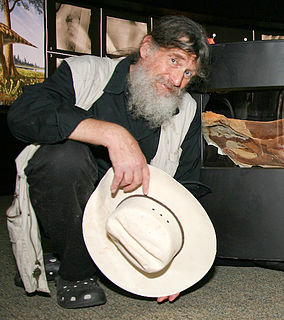A Quote by George Carlin
When you look at Earth from that one picture, the one from space, it's really a rather attractive thing. I have nothing against the planet per se. I root for the big comet or asteroid as a way of cleansing the planet. The comet or asteroid 65 million years ago is probably what gave us our opening to replace the reptiles. The greatest entertainment I have in my life is chronicling internally, not necessarily for the public, the slow dissolution of order.
Related Quotes
The chunks of comet Shoemaker-Levy 9 were so large, and were moving so fast, that each hit Jupiter with at least the equivalent energy of the dinosaur-killing collision between Earth and an asteroid 65 million years ago. Whatever damage Jupiter sustained, one thing is for sure: it's got no dinosaurs left.
It shouldn't be so difficult to determine what a planet is. When you're watching a science fiction show like 'Star Trek' and they show up at some object in space and turn on the viewfinder, the audience and the people in the show know immediately whether it's a planet or a star or a comet or an asteroid.
Global warming, along with the cutting and burning of forests and other critical habitats, is causing the loss of living species at a level comparable to the extinction event that wiped out the dinosaurs 65 million years ago. That event was believed to have been caused by a giant asteroid. This time it is not an asteroid colliding with the Earth and wreaking havoc: it is us.
The future is about wings and wheels and new forms of space transportation, along with our deep-space ambition to set foot on another world in our solar system: Mars. I firmly believe we will establish permanence on that planet. And in reaching for that goal, we can cultivate commercial development of the moon, the asteroid belt, the Red Planet itself and beyond.
I would love to see the world's space programs continue toward sending humans to an asteroid or to Mars, with, of course, a full plan in place to bring them back. That excites me. And one of the things that excites me most about space is that we can go up there and put spacecraft in orbit with sensors that will help us measure the health of our planet, which is becoming particularly important. Our planet needs to be observed.
































